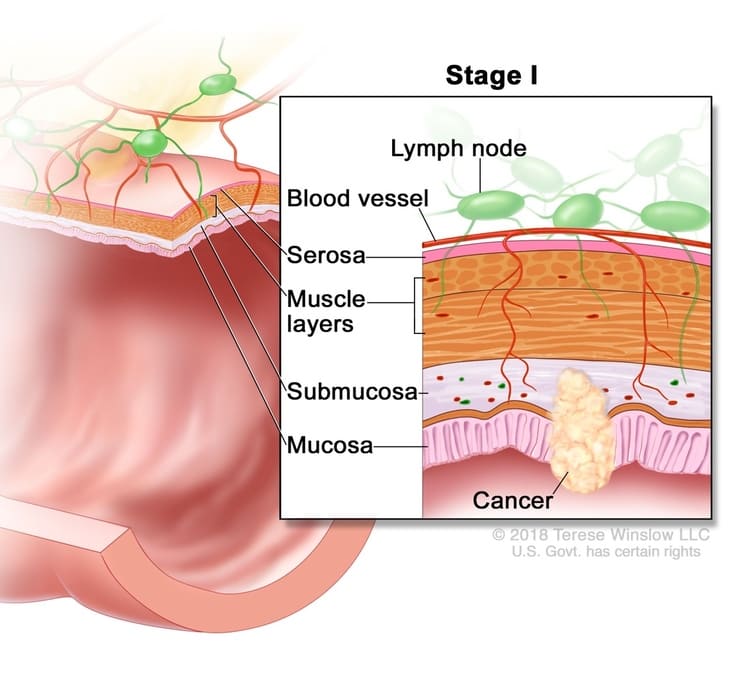Stage 1 Rectal Cancer ICD 10 is C20.
Tap “Watch Now” for an easy-to-understand overview of Stage 1 Rectal Cancer.
- Stage 1 Rectal Cancer Diagnosis
Overview
A Stage 1 Rectal Cancer diagnosis shows up in 2 ways.
1. The cancer has formed in the innermost layer of the rectum wall called the mucosa and has spread to the layer of tissue next to the mucosa called the submucosa, shown here in light pink,
or
2. The cancer has spread to the muscle layer of your rectum wall, shown in orange.
In either case, the cancer has not affected the closest lymph nodes or other organs in your body, as shown here.
What Tests Will I Need and Why?
A Rectosigmoidoscopy (a thin tube with a camera that is introduced through your anus to see the inside of your colon) is usually the first step to identify the tumor inside your colon and take samples for analysis.
Blood and Imaging tests are done to understand your general health, confirm your diagnosis and determine your cancer stage.
Tissue analysis is also typically done through a biopsy to identify the cancer cell type, which is critical to finding the best treatment option for you.
If your treatment team has not already performed tests to determine your cancer’s features, please ask your doctor when these tests will be performed.
Re-read this summary as needed and then tap, “Compare My Treatment Options Now“. Our unique Comparison Page will help you understand your FDA-approved treatment options including, who can help you pay for your treatment, where and how each is given and what side-effects you may experience.

National Institute of Health/ treatment-rectal
Recommended Rectal Cancer Videos

Colorectal Cancer
Overview and Introduction

How Cancer Spreads
Metastatic = Advanced

Diagnosing Your Cancer
How Does a CT Scan Work?

Diagnosing Your Cancer
How Does a PET Scan Work?

Exercise! You Can Do It
Reducing Side Effects & More
Commonly Searched Questions
Stage 1 Rectal Cancer Survival Rate
Source: Cancer.net
Stage 1 Rectal Cancer Treatment
Source: Cancer.org
Stage 1 Rectal Cancer Symptoms
- constipation
- diarrhea
- changes in stool color
- changes in stool shape, such as narrowed stool
- blood in the stool
- bleeding from the rectum
- excessive gas
- abdominal cramps
- abdominal pain
Source: Healthline.com
Stage 1 Rectal Cancer Recurrence Rate
Source: pubmed.ncbi.nlm.nih.gov
Stage 1 Rectal Cancer Definition
Stage 1 rectal cancer, means that your tumor is invading the intermediate layers of the rectum (submucosa or muscle), but it has not affected the closest lymph nodes or other organs.
Stage 1 Rectal Cancer Prevention
- Healthy Diet: Eat a diet high in fruits, vegetables, whole grains, and legumes. Limit intake of red and processed meats.
- Maintain a Healthy Weight: Achieve and maintain a healthy weight through a balanced diet and regular physical activity.
- Regular Screenings: Adhere to recommended screening guidelines, especially if you have a family history of colorectal cancer or other risk factors. Screening can detect precancerous conditions and early-stage cancers.
- Avoid Smoking: Do not smoke and avoid exposure to tobacco smoke.
- Limit Alcohol Intake: Consume alcohol in moderation or not at all.













